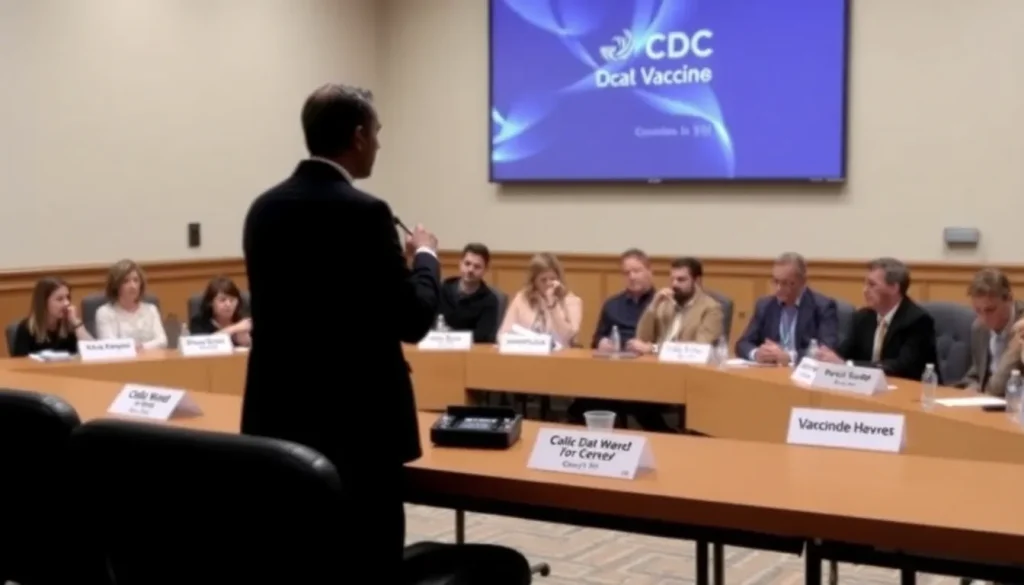CDC Vaccine Meeting Concludes with Vote on COVID Shot Access

The ongoing discussions and debates surrounding COVID-19 vaccinations continue to capture public attention, particularly as new information and perspectives emerge during critical meetings. Recently, a meeting convened by the Advisory Committee on Immunization Practices (ACIP) showcased a blend of medical expertise and anecdotal claims that raised eyebrows. Participants expressed varied opinions, reflecting the complexities of public health communications in a pandemic context. Let's delve into the key highlights and implications of this significant gathering.
Debates at the ACIP meeting
During the ACIP meeting, several notable figures made claims that sparked considerable discussion. One of the attendees, Hillary Blackburn, a pharmacist and daughter-in-law of Senator Marsha Blackburn (R-Tenn.), raised concerns regarding a personal family experience. She shared that her mother developed lung cancer two years post-vaccination, implying a potential link between the vaccine and the disease without presenting scientific evidence.
In a similar vein, Evelyn Griffin, an obstetrician and gynecologist from Louisiana, brought her own research into the conversation. Griffin, who reportedly lost her job due to her refusal to be vaccinated, suggested that the mRNA technology utilized in COVID-19 vaccines could convert to DNA in human cells and integrate into genetic material. This assertion led her to engage directly with a scientist from Pfizer, a manufacturer of one of the mRNA vaccines, seeking clarification.
Scientific response to vaccine concerns
The Pfizer scientist, maintaining a calm demeanor amidst the heated discussion, firmly countered Griffin's claim. He explained the biological processes involved, stating: "RNA cannot reverse transcribe to DNA and transport from the cytoplasm to the nucleus and then integrate." He emphasized that such processes require specific molecules and enzymes that are not present in human cells and are predominantly associated with retroviruses.
Importance of evidence-based decision making
From the outset of the meeting, representatives from established medical organizations emphasized the critical need for the ACIP committee to move away from anecdotal claims and ensure rigorous adherence to evidence-based frameworks in their decision-making processes. Such frameworks have historically involved:
- Comprehensive evaluations of clinical data
- Methodical assessments of vaccine safety and efficacy
- Consideration of peer-reviewed studies and expert opinions
The call for a return to high-quality evidence-based practices was a recurring theme, aimed at reinforcing the integrity of public health recommendations.
Controversies and challenges in the dialogue
Retsef Levi, who has publicly voiced opposition to COVID-19 vaccines, became a focal point during the meeting. He raised concerns about the perceived lack of high-quality clinical trials demonstrating vaccine safety, labeling calls for methodological rigor hypocritical. Levi's comments prompted a heated atmosphere, as he stated, "With all due respect, I just encourage all of us to be a little bit more humble."
This tension escalated when a microphone inadvertently picked up someone disparaging Levi by calling him an "idiot." This incident illustrated the charged emotions surrounding vaccine discussions and highlighted the broader societal divides that have emerged amid the pandemic.
The role of public perception in vaccination campaigns
The discussions at the ACIP meeting underscore the importance of addressing public perceptions regarding vaccinations. Misinformation and anecdotal experiences can significantly influence individuals' willingness to get vaccinated. Public health officials face the daunting task of countering this misinformation effectively while maintaining public trust. Key strategies include:
- Engaging with community leaders to disseminate accurate information
- Providing transparent data on vaccine safety and effectiveness
- Utilizing social media platforms to clarify misconceptions
By prioritizing clear communication and evidence-based responses, public health organizations can work to foster a more informed public discourse surrounding vaccinations.
Future implications for vaccine policy and public health
The discussions and decisions made during ACIP meetings will have lasting implications for vaccination policies in the United States. As new variants of the virus emerge and vaccination campaigns evolve, it is crucial for health authorities to ensure that their recommendations are grounded in robust scientific evidence.
Moreover, the challenges of navigating public sentiment will likely persist. Vaccine hesitancy is influenced by a myriad of factors, including personal anecdotes, social media narratives, and broader societal trends. It will be vital for health officials to remain adaptable and responsive to these dynamics moving forward.
Conclusion
The ACIP meeting served as a microcosm of the broader debates surrounding COVID-19 vaccinations. As participants grapple with scientific evidence and personal experiences, the path forward will require a commitment to transparency, rigorous evaluation, and an ongoing dialogue between public health experts and the communities they serve. Addressing these challenges effectively is essential to ensuring the success of vaccination efforts and protecting public health in the face of ongoing challenges.
For additional insights into the evolving discussions around vaccine policies, consider viewing this informative video that captures key moments from the recent ACIP discussions:




Leave a Reply